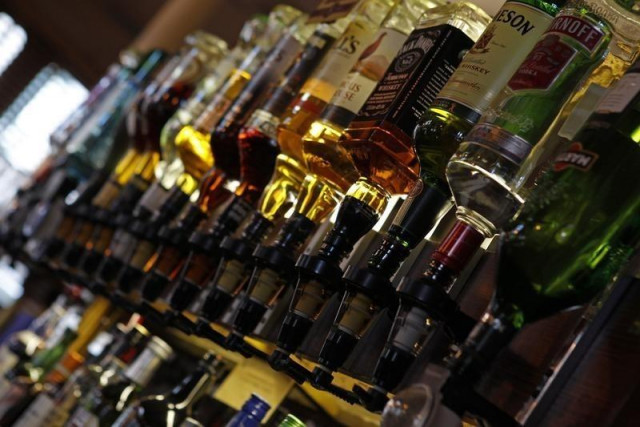Alcohol-linked deaths in UK rise in people aged 50-above
Raising new concerns for baby boomers' consumption of alcohol

Bottles of alcohol PHOTO: REUTERS
The United Kingdom’s Office of National Statistics [ONS] on Tuesday published that in 2016 the number of alcohol-specific deaths in 50 and over was 5, 208 to 3, 582 in 2001 while the number of deaths remained stable in under-50 at 2,118 for 15 to 49-year-olds – exactly the same as last 15 years.
Interestingly, the number of older people has increased in the UK, the number of alcohol-linked deaths has also risen for those aged 55 and above while the rate has fallen for younger age group.
Govt plans to use tech to check alcohol sale
“The latest statistics are a wake-up call to the rising problem of alcohol misuse in a generation of baby boomers that need urgent consideration by our public health and clinical services in the UK,” said Dr Tony Rao, the co-chair of substance misuse in the older people working group at the Royal College of Psychiatrists.
“What we need to be doing is having a greater focus on commissioning services for people with more severe drinking problems and that doesn’t seem to be happening with the fragmentation of addiction services.”
Until April 2013 the alcohol treatment in Britain was managed by the National Treatment Agency for Substance Misuse, however, the local authorities are responsible for it now. With councils restricted, concerns that drug and alcohol addicts are not receiving the help they need has become prevalent.
“Alcohol-related deaths are preventable, and councils would be able to do more if government reverses the cuts to the public health grant in the autumn budget,” said Izzi Seccombe, the chair of the Local Government Association’s community well-being board.
Meanwhile, Rao stressed that the figures were of particular concern since the new ONS definition on alcohol required it to “to have a much closer relationship to the cause of death”.
Previously the definition was ‘alcohol-related” deaths but it was changed to create coordination between government departments and agencies and to curtail ambiguity. According to ONS, the “new measure produces a death count that is on average 18.7 per cent lower for males and 24.6 per cent lower for females.”
People take more risks after downing alcohol-caffeine cocktail, says study
Alcohol-specific death rate increased by 50 per cent in men aged 70-74, in women aged 60-64 it rose by 35 per cent in 2001. But the largest jump of 55 per cent for men and 40 per cent for women was seen in the 80-84 age group.
On increase among older people, the ONS suggested that it “may be a consequence of the misuse of alcohol that began several years, or even decades, previously.”
“A heavier-drinking postwar generation is now reaching an age where accumulated alcohol harms start to have a real impact. This is why it’s so important that high-quality alcohol interventions are made available to older drinkers, many of whom do not or cannot access alcohol services,” said Dr James Nicholls, the director of research and policy development at Alcohol Concern.
The rate among all-age groups remained constant since 2013 at 11.7 but higher than 2001 [10.6].
Previous figures, published in May, showed that more than half a million people aged between 55-74 were admitted in English hospitals with alcohol-related injuries, disease or conditions – a 64 per cent rise in a decade.
This article originally appeared in The Guardian.



















COMMENTS
Comments are moderated and generally will be posted if they are on-topic and not abusive.
For more information, please see our Comments FAQ